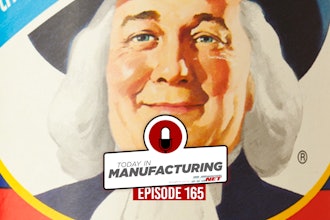According to the third annual China Manufacturing Competitiveness survey, jointly conducted by the American Chamber of Commerce in Shanghai and management consulting firm Booz & Company, multinational manufacturers are focusing less on China as an export base.
But that doesn’t mean they’re leaving the booming Asian nation.
Instead, manufacturers have shifted their focus to accessing the growing China market. Manufacturing.net sat down with Booz & Company partner, Conrad Winkler, to discuss the findings.
Mnet: What prompted the change from using China as simply an export base?
Winkler: It's been a shift that's been happening as more companies become interested in the market -- or as much in the market -- as it has a low-cost manufacturing location.
Five years ago, the number of people that could buy more expensive products was much more limited than today. The shift has been in the Chinese market itself as China’s standard of living goes up.
For instance, China’s automotive industry has seen huge sales growth and anyone in this industry currently wants to be involved in that market and as well as export to the U.S. and other places.
The boom that's going on right now in China -- and is expected to continue in the next 10 years -- is something everyone is looking to be a part of.
However, there are people starting to realize that as China's standard of living goes up, they inevitably will no longer be the lowest-wage location.
Mnet: If manufacturers are choosing to stay, how are they addressing the challenges of rising labor and transportation costs and quality issues in China?
Winkler: It is pretty clear that whereas before companies were focusing more exclusively on getting their product up and running, this has been a year in which companies worked on processes as well -- we saw more put in place cost control systems and an increased focus on lean manufacturing.
We also saw on the sourcing side, companies starting to look more closely at the supply base they're using in China. Previously, companies focused on developing and getting suppliers in place, but now they're looking more broadly for cost, quality and consolidating suppliers.
If you look at the percentages, 22 percent of respondents said they were enhancing internal cost control measures, 17 percent were improving productivity and increasing innovation, another 17 percent were implementing lean manufacturing, 16 percent were applying energy-savings measures and 15 percent said they were relying on increased sourcing efforts.
These percentages were all reasonable increases from previous years.
Companies are also looking at the cost of their manufacturing footprint in China. There are some areas in eastern China where land costs have gone up so much that it is more viable to move.
As a result, a surprising number are willing to pick up and move elsewhere in China. The Shanghai region typically has wages between $1.80/hr to $3.00/hr in manufacturing and if you move west, it drops down to $1.20.
Mnet: Will pressure to increase the value of China’s currency have any affect on manufacturers?
Winkler: If the yuan gets revalued higher it will be an issue for companies with manufacturing bases there, but it is a lot less of an issue than what it's made out to be.
Of these products being sold, the big portion is raw materials. In the U.S., 50 percent of the product cost is labor, and 50 percent is raw materials. In China, for that same product, 90 percent of the cost is raw materials and 10 percent is labor. Labor is such a small portion of their relative costs. Raw material pricing, on the other hand, is determined by the global markets and isn’t as affected by currency values.
So yes, companies are concerned about currency but it's not causing people to say "We're about to split, because the currency is getting valued higher." In fact, the relative stability of Chinese currency is one thing people spoke most positively about for reasons to maintain their position in China.
Mnet: Are there any particular issues that would cause manufacturers to leave?
Winkler: The concern is the East and Shanghai region with its much higher costs in labor and land that's making companies think about going West within China.
For those that are thinking of going elsewhere, most are considering other places in Asia like India, Vietnam and Indonesia, with India being highest.
Mnet: Energy costs are a concern for any manufacturer -- is China becoming more focused on ‘green’ energy?
Winkler: China is similar to the west in that companies are very interested in green when it saves them money. If you look in particular at energy savings, companies are very interested in changing lighting, HVAC, and anything within their facilities to reduce energy and utility costs.
Outside of that, there is not much interest from a green standpoint. If it's not saving money, it will get a lower priority. We found that not entirely consistent with what we see in the West. Companies in the West consider green an important part of their reputation, but there's less focus on ‘green’ as a sales technique in China.
Mnet: Your survey reports that manufacturers have shifted their hiring focus in China as well. What are they doing differently?
Winkler: The young Chinese work force is looking to learn skills and capabilities that they think will help them in the future and value that just as much, or more so than compensation. They are looking for places they can grow or learn a set of skills that will be valuable, and that has been shown to improve retention and increase value.
As a result, many companies found that the secret sauce to keeping its work force in China was not only wage raises, but providing training and opportunities for their employees. Investment in the employees is improving quality and innovation, so it's incredibly important to companies from more than just a cost perspective.
Mnet: Are manufacturers addressing quality issues in other ways as well?
Winkler: Quality has always been a huge issue in China and companies have been working on quality for a long time. Quality has improved immensely but still isn't at the same level as U.S. and European manufacturers.
For example, automotive quality in China is 10 times better than it was 10 years ago, but it's still not the same quality level that you would find in the U.S. for finished, locally assembled goods.
And there's also this cost issue -- getting raw materials of the right quality involves a great deal of effort. It includes both improving the quality of their suppliers, but also trying to localize the supply instead of importing into China, which provides huge cost savings.
From a sourcing standpoint, they're looking at more consolidation of suppliers they want to invest in and train and improve their quality as well.
Mnet: What are some key trends you expect to see in the next few years from multinational manufacturers with operations in China?
Winkler: The key trends we’ll see are a combination of the duality play between rising cost and changing roles of manufacturing. China is still going to be a low-cost location, but now companies are looking to change the role of manufacturing to handle innovation and the ability to meet a wide range of product requirements for the local Chinese market.
As more companies focus on products to develop for the Chinese market, they are bringing in more engineering capabilities so they will be closer to the market as well as cheaper.
At the same time, others are more focused on cost and we see this trend of shifting further west in China where land and labor is cheaper. More sophisticated manufacturers will remain in the East, but will focus on cost control capabilities and lean manufacturing -- which is few and far between so far.
Mnet: Why is lean manufacturing not as prevalent in China?
Winkler: At the heart of it, labor has been so cheap so companies haven't put a lot of energy into lean manufacturing processes. Focus was more on growing and quality. Suddenly, with the recession, companies had to re-evaluate their processes and we’ll see this trend continue.
Conrad Winkler is a Partner of Booz & Company and an expert in manufacturing strategy, manufacturing transformation, and supply chain management. For more information visit, www.strategyand.pwc.com






















